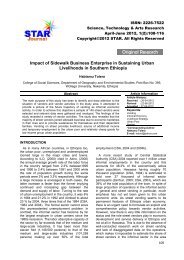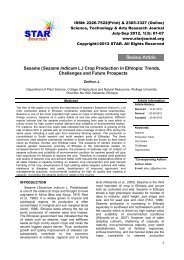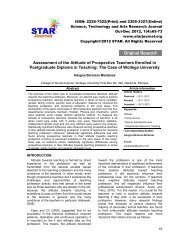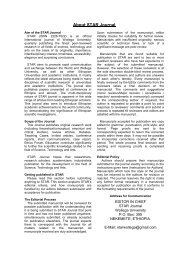Tesfay Tolessa Bessa <strong>STAR</strong> <strong>Journal</strong>, July-Sep 2012, 1(3): 88-96OromoMootii biyya keenyaa yaa Hayilee SillaaseeXaaliyaaniin si’agarraan dheeffaa dhokkee kaasee(Ibid.)Although the permitted time was not convenientfor listeners since it was the time when they wentto bed, the Afran Qalloo were able to break theestablished stereotypical attitude that “the Oromolanguage would break a radio”.On the other hand, when the Oromo nationalconsciousness was transformed into armedinsurgency as what happened in Baalee, all thesongs of Arfan Qalloo failed under a strongcensorship. Order was passed to hunt dawn all themembers and the committees of the band. Somewere imprisoned, and some of them becameinsane because of the severe torture they hadundergone. The others like Ayuub Abubakir,Abubakir Musa, Yonis Abdullah, Abdullah Arsi,Shantam Shubbisa, and Suleyman Yusuf wereexiled to Somalia, the then deadly enemy ofEthiopia. In such a way, the band was forced tocease its movements under the name of ArfanQalloo cultural and Musical band and wasdisintegrated into village based minor groups whosustained the already started musical cultureclandestinely (Alfia, 2007). Yet, the village basedmusical band produced large number of musicalpoems and theatrical essays in Oromo language.Most of the songs and theatrical essays wereloaded with covert opposition to the imperialregime (Alfia, 2007).Out of Hararge, there were also individualsinserted into the bands of Amharic language topresent their songs occasionally. Such singerswere mainly found in the imperial militaryorchestra. Ababa Tesemma, Wasanuu Diido,Birratuu Lammaa and Tilahun Gesess÷ weresome of them. Informants assert that suchsingers were allowed just only one Oromolanguage song at one occasion in order to avoidOromoBilisummaan aannanii nama beekutu dhugaaKan bilisummaa hi beeknnee bira taa’ee mugaa.Bilisummaan bilisummaan gaaridhaYaa obolleeyyan ka’aa hirribaa .Baasa hinjirree nuutti as baaseeHaqa keenyaa addaan facaasee.Dachee keessan masinoo keessanKan irra taa’u adawwii kessanMaa callistanii teessan?(Ibid.)The song expresses the need of freedom foroneself to live as a human being and agitates theHarar Oromo to stand against the naftagna whotook their land, properties and destabilized theirGlossO! Haile Sillasie our kingTerrified by you the Italians had run away and escapedidentity question to be posed by the Oromo in themilitary forces of the emperor. Even withpurposive participation, some of the singers like,Wasanuu Diidoo and Birraatuu Lammaexperienced a disrespect reception and werereported to have been repeatedly imprisonedsimply for singing in afaan Oromo. Moreover, asthe political inspection on the Oromo becamestrengthened, doing such activities in groupsgradually declined.The exiled members of Afran Qalloo beganserving as singers and journalists in radioMogadishu which began transmission in Oromolanguage in 1963. Although the Somaligovernment used the radio for its warpropaganda against Ethiopia over the Ogaden, italso became good advantage for the exiledOromo to address their cases to their people. Thetransmission was conducted in the name ofexposing the marginalization policy of theemperor against the Oromo and Muslim societiesof eastern Ethiopia. The Oromo language songsand drama transmitted over Mogadishu radioserved for such purposes although its primaryaim was to create pan-Oromo movement againstthe burdens imposed on them by the naftagnaadministrators( Abduselam, 2008; Informants:Ibrahim Haji, Musa Ahmad and Ali Dima).Most of the songs broadcasted over the radioMogadishu were composed by Ayyub Abubakirand Abubakir Musa in Somalia. Informants alsoreported that Shayk Bakrii Saphaloo was sendinghis revolutionary poems to be broadcasted andthe songs were transmitted without mentioningthe name of the author (Ibid.). One of the samplesongs sang by Yonis Adullah over the radioMogadishu is transcribed bellow.GlossFreedom is milk and who knows drinks itWho does not know it catnapped being asideFreedom, freedom is goodO! Brothers do not sleep, be awake.Tthey brought up on us which does not existThey disturbed our rightYour land, your farmIs taken off by your enemyWhy do you sit keeping quite?cultural treatment of fairness. In doing so, it wasable to withdraw many Harar Oromos andMuslims to the side of Somalia, besidesaggravating the Baalee peasant rebellions. The91
Tesfay Tolessa Bessa <strong>STAR</strong> <strong>Journal</strong>, July-Sep 2012, 1(3): 88-96message of the song had historical connectionthat it is said to have provoked the Harar andBaalee Oromo who went beyond control(Informants: Ibrahim Haji, Mohammad Qophe,Mahadi Mude). The fact that the Somaligovernment allowed to broadcast Oromo songsthat expressed their deep feelings in theirlanguage, the Harar and Baalee Oromoadmiration for the Somali governmentoutweighed that of Ethiopian.While the Oromo cultural movement waswithin such circumstances, the reign of theemperor began to be challenged by all cornerspolitical turmoil. The combination of theestablishment of different ethnic based liberationfronts, peasant rebellions, university students callfor land reform, establishment of Machaa-Tuulama Self Help Association, objection oneducational sector reviews, and the likesoverthrown the Emperor and shifted power toDarg(Markakis, 1994, Bahru,1992).The movement of Oromo Cultural Troupesunder Darg. As soon as Darg came to power, ithad understood the importance of communicatingthe mass through the media. (Informants: HamideMude, Kebede Firrisa and Ibrahim Haji). No lessthan the socialist propaganda, by design ordefault, the Oromo proverbs, folklores, songs,glories of culture and history were broadcastedthrough the Oromo language mass media (Olana,1993; Informants: Mahadi Mude, Ibrahim Haji).When the broadcast educated people about theirculture and language, inadvertently the peoplelearned the glories of their language, culture, andhistory. The Oromo of border areas like Harar,Bale and Wallagga, who could get easy access toradio through smuggling, were the mostinfluenced areas. The regions became the areaswhere armed insurgency operated unlike theother parts of Oromo land (Informants: AliMohammed, Hallo Dawe and Adimasu Berhanu).With the revolutionary regime which presenteditself as people’s government, any forms ofwritten Oromo language literature includingdrama and songs got some outlets. In 1975 thesecond generation of the Afran Qalloo culturalband; Ali Birraa, Ibrahim Haji Ali, Himee Yusuf,Adam Usuman, Mohammed Umar, AbubakarAddawwe, Ahmad Yonnis and others werereorganized under Biiftuu Birra Band(AutumnSun) and began their performances in differentnight clubs in Addis Ababa. In doing so, theyenabled Oromo music to see the light of the dayin the country’s capital. They also made theOromo language the source of income(Informants: Ibid., Mahadi Mude, Ibrahim Haji).This band was also able to play their songsand perform dances over the Ethiopian Televisionand popularized the Oromo musical band of AduuBirraa. The members of Maccaa-Tuulamaa SelfHelp Association and Oromo students who heardthem either on musical shows at hotels or onTelevision began encouraging them to go to theprovinces where the Oromo population wasdominant. In 1976, they went to Wallagga andpresented their cultural show almost in all themajor towns of western Wallagga. On thatoccasion, one of campaigners of thedevelopment through cooperation, AbtawKabada, disserted the campaign and joined theband. At Harar Abtaw also producedrevolutionary songs which revealed Oromofeelings for the Darg administration. They alsoencouraged the Oromo youngsters of the regionto establish their own cultural bands to expresstheir feelings. Based on that GuddattuuWallaggaa, Burqaa Boojji, Biqiltuu Mandii andLalisaa Najjoo in Wallagga were establishedimmediately following the cultural shows (Ibid.)In the organization of the Wallagga culturalbands Tesemma Nagarii played amazing rolesbeing within the highest officials of the Darg.According to my informants, he saved the lives ofmany singers from the guns of the Darg. He alsocomposed many songs which express thecondition the Oromo had experienced underImperial regime and what they going to test underDarg covertly. Majority singers originally fromWallaggaa were the unreserved works ofTesemma Negeri (Gada, 1998).The government also employed some Oromosingers in the National Theatre, Hager Feqer(Love of the Country’s Theatre), Addis AbabaCultural Theatre and in the military divisions. AliBirraa (For some Time), Hailu Disaasaa, AdmasuBerhanu, Taddasa Cuqee, Daraj÷ Zamadu,Sahela Dagaagoo were among the employedartists. However some of the peoples whom Iinterviewed claim that they were rarely invited onpeople’s gatherings and were only allowed tosing only one or two Oromo songs at occasion.They claimed that abroad cultural shows wererarely permitted for the Oromo singers. Non-Oromo speakers, who did not know both thecultures and language of Oromo, were invited topresent Oromo songs by trial. According to theinformants, such kind of maladministration hadtwo impacts. The first, since the imitators couldnot show the real culture to which he did notbelong, it reduced the entertaining elements ofthe culture. Secondly, it also affected the moralsand economic aspects of the singers the culturesbelong (Informants: Hailu Disasa, AdmasuBerhanu, Mahadi Mude, and Ibrahim Haji).92















